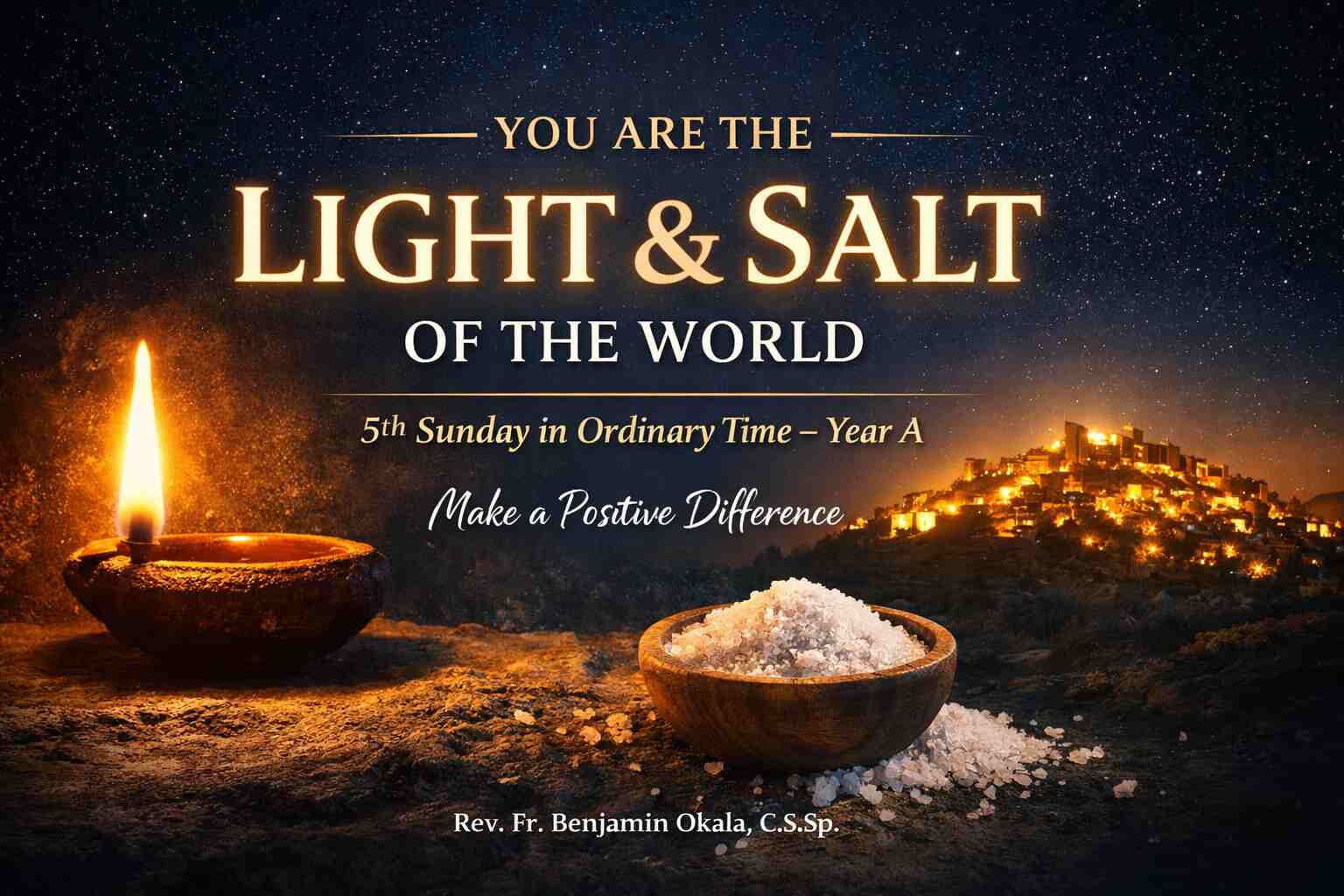Homily of the 3rd Sunday of Advent, Year C
1st Reading: Zephaniah 3:14-18; 2nd Reading: Philippians 4:4-7; Gospel: Luke 3:10-18
Every third Sunday of Advent is traditionally referred to as “Gaudete Sunday,” meaning “Joyous Sunday.” Gaudete is derived from the Latin opening words of the introit antiphon, “Gaudete in Domino semper: iterum dico, Gaudete.” Its translation is, “Rejoice in the Lord always; again I say, rejoice.” The Church celebrates this special day as a reminder of the joy found in Christ’s redeeming work among us, a joy we will fully commemorate on Christmas Day. This is a moment of joyful anticipation as we draw near to the celebration of Christ’s birth.
Unfortunately, many people are constantly seeking what can always give them happiness and joy. They search for it in material possessions, achievements, and fleeting pleasures. Yet true and lasting joy seems to elude them. The readings for this Sunday offer us a different perspective. They invite us to find true joy not in the temporary things of this world but in the eternal love of God manifesting in Jesus Christ. To trust in His promises and find joy even while waiting and in uncertainty. Please join us as we reflect on how to truly rejoice in the Lord.
FINDING TRUE AND LASTING JOY
Many people are constantly seeking what can always give them inner joy, happiness, peace, and solace in their lives. They search for it in material possessions, achievements, fame, beauty, intelligence, position, fleeting pleasures, etc. Yet, true and lasting joy seems to elude them because all these earthly achievements are ephemera, operating on the altar of temporality. So, if all these do not give inner and lasting joy to our souls, then what can we do to experience the inner joy of the Holy Spirit, which lasts forever?
In the Gospel, St. John the Baptist elucidates the prerequisites or necessary conditions for gaining inner and lasting joy, peace, and happiness in our souls. He calls us to be compassionate to those in need by giving them the necessities of life (food, clothing, shelter, etc.). We are to be contented with what we have and not intimidate, accuse, or defraud people to enrich ourselves. Instead of arrogance, pride, and selfishness, we are to be kind, charitable, and humble in everything we do.
THE SECRET TO DIVINE JOY
What St. John the Baptist wants us to do is to consistently practice the works of mercy, both spiritual and corporal. These works of mercy, according to the Church, are charitable actions by which we come to the aid of our neighbors in their spiritual and bodily necessities (CCC 2447). The spiritual works of mercy include instructing the ignorant, advising the doubtful, admonishing sinners, comforting the afflicted, forgiving offenses, bearing wrongs patiently, and praying for the living and the dead. The corporal works of mercy consist of feeding the hungry, giving drink to the thirsty, sheltering people experiencing homelessness, clothing the naked, visiting the sick and imprisoned, and burying the dead.
These gestures enable us to touch the lives of others positively, putting smiles on their faces, especially in this Yuletide season. When we wrap ourselves with the clothes of humility and meekness, then we shall experience the inner joy and peace promised to those who welcome Christ in their hearts. Although Christmas is still a few days away, we can begin now to rejoice in the birth of Jesus Christ. We can also look forward to His Second Coming at the Parousia when He will establish a new heaven and a new earth.
THE TRANSFORMING POWER OF THE HOLY SPIRIT
We presently live in a fallen world, surrounded by much pain and sorrow. Many people are seriously finding it very difficult to carry out the works of mercy. That is why they need the transforming power of the Holy Spirit; otherwise, they cannot succeed on their own (Zechariah 4:6). Of course, we need the help of the Holy Spirit, who, according to John the Baptist, will baptize us with fire (Luke 3:16). While water signifies birth and the fruitfulness of life, fire symbolizes the transforming energy of the Holy Spirit’s actions.
When the Holy Spirit empowers us, we will be inundated with divine joy. As the scripture says, “In the presence of the Lord, there is fullness of joy” (Psalm 16:11). Since the joy of the Lord is our strength” (Nehemiah 8:10), then, with joy, we will draw water from the well of salvation (Isaiah 12:5). We may be going through a difficult time this Advent and may not feel much like rejoicing. But one day, we will stand before the Lord, and He will wipe every tear from our eyes. On that day, we will not be able to contain our joy. When we prepare ourselves properly for that day, then we shall truly experience the inner joy and peace promised to those who welcome Christ in their hearts.
THE POWER OF THE SACRAMENT OF RECONCILIATION
There is power in the sacrament of reconciliation. Of course, confession gives one spiritual power to do the will of God. We can only obtain divine joy, happiness, and the peace of God when we truly repent (frequent sacrament of reconciliation) from our wrongdoings. It gives us inner strength and peace of mind, as well as making our souls free.
So, we need to refrain from anything that would mar our relationship with God or jeopardize the lives of others. However, we are called to rejoice this Sunday by spreading the joy of Christ’s coming to the ends of the earth through love, charity, justice, righteousness, tolerance, patience, kindness, forgiveness, etc., with the help of the Holy Spirit. Being compassionate to people is the only short way to gaining inner (divine) joy and peace.
THE IMPORTANCE OF PRAYER
Prayer is the lifting up of our hearts and minds to God, a spiritual communication between humanity and divinity. It is the lung by which our spiritual life breathes, that is, the atmosphere in which our spiritual life floats.
In the second reading, St. Paul urges us to always offer prayer and supplication with thanksgiving to God in everything (Philippians 4:6). Through prayer, we draw strength and guidance from the Holy Spirit, enabling us to live out the Gospel message of love and compassion.
CONCLUSION
Dearly beloved, we are called this Sunday to rejoice in the Lord and to find joy in Christ’s coming. Notably, lasting joy is not found in material possessions, fashion, beauty, intelligence, fame, positions, or achievements. However, the only condition for us to experience it is through love, repentance, showing compassion, and alleviating the problems of others.
When we do these things, then with joy, we shall draw spiritual nourishment from the Lord’s well of salvation (Isaiah 12:5). Let us go forth this Gaudete Sunday, filled with the joy of the Lord, and share that joy with all we meet.
PRAYER:
May you be filled with the anointing power of the Holy Spirit, and may the joy of the Lord be your strength through Jesus Christ our Lord. Amen.
Peace of Christ be with you…
Rev. Fr. Benjamin Okala, C.S.Sp.



